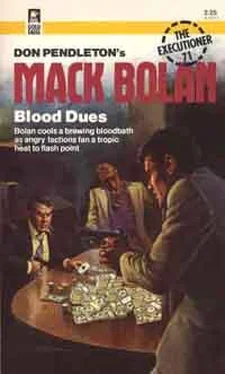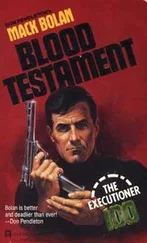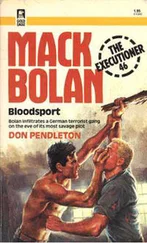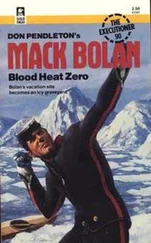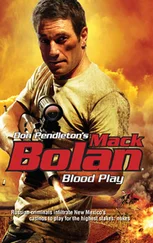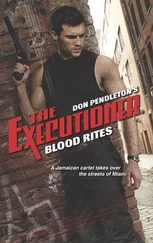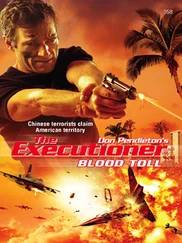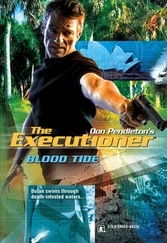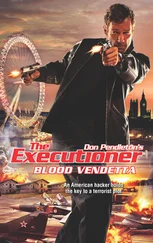He wondered if the hit on Drake could be related to the near miss on John Hannon. Somehow, Drake's best men had failed to take the nosy private eye, and they had gotten themselves killed in the bargain. Ornelas had no faith in mere coincidence. He realized that the events were probably related, but beyond that realization he could not proceed. Without some leads, at least a clue to the identity of Drake's assassins...
No matter how it read, the failure to eliminate Hannon left some dangerous loose ends. He would have to try and snip them off before they had a chance to multiply like roaches in the woodwork.
Toro's jailbreak, naturally, had been the worst news of the day — hell, of the year. The timing, on the eve of Ornelas's bold scheme, could not be automatically dismissed as chance. If there was some dark, guiding hand behind it...
Briefly he reflected on the string of violent incidents around Miami through the morning hours and early afternoon, all seemingly directed at the operations Drake and Phillip Sacco had their fingers in: drugs, gambling, women.
Raoul Ornelas had not survived so long on the fringes of the underground by trusting chance or letting others do his thinking for him. He was worried now, and with good reason. Something was afoot around Miami and right now he did not have a clue as to what might be going on.
Ignorance was no way to survive in war. And it was war that had taught him to survive. He stared at the phone as he recalled the past.
As a teenager he had fought for Castro against the animal Batista, battling to release his native Cuba from a tyranny that had oppressed her people for a generation. He had lost a brother in the fight and counted it a small price to be part of history.
He had survived to see the people's revolution twisted and transformed into something else, with the appearance of the Soviet "advisors" and Fidel's admission that he was, indeed, a secret Communist.
When exiles started fleeing from their homeland to the coast of Florida, Ornelas went with them, vowing that someday he would return and finish what he had started as a young guerrilla in the mountains.
He had joined the anti-Castro movement in Miami at a time when it was smiled on by the U.S. government. He felt betrayed by the movement he had risked his life for, and he sought a way to win revenge against his traitors. The CIA had helped him hone his martial skills, and at the same time they had taught him all the grim realities of power politics, of working with the Mafia to gain your end results, of using anyone and anything that might aid the cause.
Then tragedy struck the Ornelas family again. Raoul had lost another brother at the Bay of Pigs, cut down by Castro's gunners on the beach when American air support failed to arrive on schedule. He had seen the exile movement betrayed by so-called friends, the U.S. pulling back support and closing down the training camps in Florida and Louisiana, harassing the movement's leaders, opening relations, finally, with Fidel.
To Raoul Ornelas, the missile crisis, all the rest of it since 1961, was window dressing. He was learning quickly that the end result was all that mattered. Never mind the changing cloak of ideology that could be donned and then discarded in an instant, for convenience.
Power and wealth were the keys, and he was determined to secure them at any cost.
Ornelas served himself now, working free-lance for anyone who paid his price. Today, the price was brought by drugs and terrorism in the proper cause.
But it was tomorrow that worried him. A violent storm was clearly brewing in Miami and he could not tell which direction the wind was coming from. And now, somehow, Toro was on the loose again, perhaps already looking for him.
They had been friends once, Ornelas and Toro, back when both of them were young, idealistic soldados in the cause of Cuba libre. Somehow, Toro never quite outgrew naive idealism. He still believed in capitalismjustice for the people. He resisted all attempts to see the light. That made him an obstruction; one that had to be removed in order for Raoul Ornelas to advance himself.
Removal had been surprisingly easy. Toro's trust, his sense of honor and loyalty, worked against him in the end. He refused to see that there were those around him who would betray him if the price was right.
Ornelas had balked at killing Toro. It was a tactical mistake that Ornelas now believed he would soon regret. At the time it had seemed enough to frame Toro, pack him off to prison. By the time he won release, Ornelas would have Toro's soldiers safely locked into Raoul's own private army. They would be seeing more action, making more money. And when — if — Toro won parole, he would be a forgotten man.
Except he was out right now, and suddenly, things were starting to go sour for Raoul Ornelas.
He felt himself becoming more and more agitated by the moment, trying desperately to keep control of his emotions, of his men. His very life, he knew, depended on his ability to lead, to fill his men with confidence and make them do his bidding gladly.
So far, everything had gone according to Ornelas's master plan, the pieces falling into place as if by destiny. At the final hour, everything was ready. The money — most of it, at any rate — had already been deposited in Ornelas's clandestine bank account.
The thought of his employer only made Ornelas worry more. He had accepted payment, promised to perform... and now, he was beginning to have deadly second thoughts. Too late to call the operation off, of course; there would be no way to stop it. But for the first time in a long career of fighting for assorted causes, Ornelas had doubts about his own ability to pull a mission off.
And why had Toro's break come now, with Ornelas's biggest operation yet less than a day away? Toro might spoil everything — by bringing down the heat from his escape on Little Havana, or by himself, in his quest for revenge.
Ornelas knew that Toro blamed Raoul for Toro's time in jail. It had not taken the canny exile leader long to decide exactly who had fingered him. While he was in the lockup, Toro's rage was impotent, wasted on the walls that held him captive. Now he was free to track Ornelas, to take whatever action his enraged mind could conceive of.
Ornelas wondered who had helped his former friend escape. Someone was supporting him, at least with tactical assistance on the break itself — and that was what concerned Ornelas most of all. Alone, El Toro was a thorn in his side. But with support troops, a secret army of his own, he might turn out to be a dagger in the heart.
Ornelas felt his control slip another notch, knew that he was rapidly losing the battle to keep his wits about him. He knew what to expect if anything went wrong with the operation at this late date.
He decided to consult with his control on this one, brief him on what had been happening around Miami in the past twelve hours. If the man was dense enough to somehow miss the daily news, he had some shocks in store for him. And maybe he would have some ideas of how Ornelas could keep things from disintegrating into chaos.
Maybe.
There was a single heartbeat's tremor in his hand as he reached for the telephone receiver. At the last instant, he hesitated, deciding to try Julio Rivera one last time before he took the final step.
If he could reach Rivera, they could get together and work out something on their own without involving Ornelas's sponsors.
He started dialing slowly. But his mind was racing, checking out contingencies, alternatives. Beneath it all, he wondered where a man could hide himself when his world went up in smoke.
The Cuban embassy located in Miami is a minifortress, built to keep its occupants inside and all intruders out. Some ninety miles from home, surrounded by the hostile thousands of their countrymen, the members of the consulate do not take any chance with security.
Читать дальше
